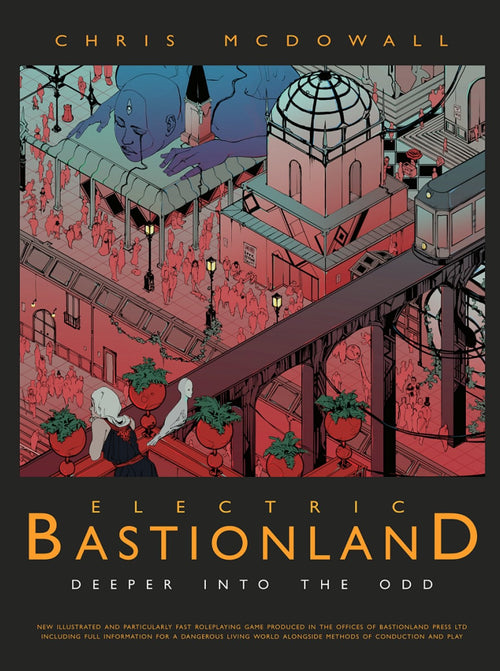Electric Bastionland Fantasy; Dark; New School Revolution (NSR); Exploration-Driven; Collaborative Worldbuilding; Bleak; Resource Management
Electric Bastionland is a tabletop roleplaying game designed by Chris McDowall, expanding upon the rules-lite system of Into the Odd. It plunges players into a bleak world defined by a failed past, colossal debt, and the desperate pursuit of treasure in the vast city of Bastion, the decaying Deep Country, or the strange Underground. The game emphasizes player agency, resource management, and collaborative worldbuilding, offering a unique OSR experience with a dark fantasy theme.
Theme and Setting
Electric Bastionland presents a dark fantasy setting, characterized by a sense of bleakness and decay. The primary location is Bastion, the only city that truly matters, a sprawling metropolis rife with corruption, strange inhabitants, and impenetrable bureaucracy. Outside of Bastion lies Deep Country, a rural landscape slowly rotting away, and the Underground, a series of impossible tunnels existing beneath time and space. This setting evokes a sense of desperation and emphasizes the characters' struggles against overwhelming odds, leaning heavily on the themes of survival and resource scarcity. The setting draws inspiration from works like the Gormenghast Trilogy, contributing to its distinctive atmosphere.
Core Mechanics and Rules
The core mechanics of Electric Bastionland are designed to be rules-lite, focusing on player decisions and Referee (Game Master) improvisation. It builds upon the Into the Odd system, simplifying RPG gameplay to its minimalist core. A key element is the failed career system, where characters begin with a predefined backstory of failure and crushing debt, adding depth and immediate motivation for treasure hunting. The game uses a straightforward resolution mechanic where players typically roll under their ability scores, emphasizing resource management and creative problem-solving over complex calculations. The rules fit on a single two-page spread, highlighting the game's accessibility and speed of play.
What Makes It Unique
Electric Bastionland distinguishes itself through several key features. The failed careers are a defining element, instantly providing characters with a unique history and driving force, differentiating it from traditional character creation. The setting itself, with its blend of industrial decay, strange technology, and bizarre inhabitants, creates a distinctly odd and memorable experience. Resource management is crucial, forcing players to make difficult choices and prioritize survival. Furthermore, the game encourages collaborative worldbuilding, inviting players to contribute to the setting through their actions and choices. The debt mechanic provides a persistent, tangible motivation, pushing characters to engage with the world and seek solutions to their problems. The game's focus on simple rules and Referee improvisation allows for flexible and creative gameplay.
Target Audience and Player Experience
Electric Bastionland appeals to players who enjoy Old-School Renaissance (OSR) games with a focus on player agency and emergent storytelling. It's well-suited for those who appreciate rules-lite systems and a more improvisational style of play. The gameâs accessibility makes it suitable for both new and experienced RPG players, offering a quick and engaging experience. Players can expect a challenging and often unforgiving environment where resourcefulness and clever thinking are rewarded. The emphasis on shared storytelling and the Referee's ability to freely interpret the world around them creates a unique and engaging experience. Sessions are designed to be completed in 2-3 hours, making it ideal for one-shots and shorter campaigns.



